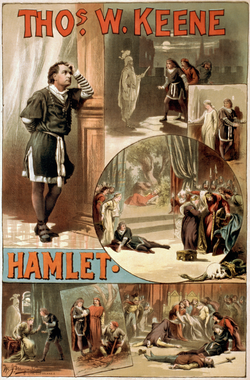"To be or not to be"- that's known as The Question. This question can be found within the play Hamlet, written by William Shakespeare between 1599 and 1601. In spite of it being one of the most performed, read, and studied plays in history, Hamlet still has some mysteries surrounding it. For example, why did it take Hamlet so long (up to the end of the play!) to avenge his fathers death? One possibility may lie right before us. The full title of the play is The Tragedy of Hamlet, Prince of Denmark. All of Shakespeare's tragedies end in the death of most of the main characters, all at the end of the play. Perhaps to preserve this theme, he did the same thing with Hamlet.
Another mystery around Hamlet is the death of Ophelia, and whether or not it was intentional. Ophelia was in quite a quandary- her father was dead, the man she loved was mad (or so she presumed), and her brother Laertes was gone. I presume that she did, in fact, commit suicide, but, it wasn't entirely of her own accord. She had simply fallen into a dangerous situation, and chose to take no action, thus committing a passive suicide.
Hamlet lamented the haste with which his mother remarried, which was so quick, the cake from his father's funeral was used for the wedding. He also considered this union an unholy one, and took it as a sign of weakness from his mother.
Early on in the story, though, the ghost of his father comes along and captures the attention of the guards outside the castle, who frighten the thing away. They inform Hamlet, who soon goes to see it. Hamlet and the spectre converse. As it turned out, his uncle Claudius usurped the old king and now father asks son to avenge his name. Hamlet, already upset by the marriage, agrees to follow through, and devises a plot to assassinate Claudius that involves feigned insanity and various other strange acts.
My Thoughts
I found Hamlet to be a riveting, interesting story, and also found out that it's the basis for lot's of modern day media.
I was a little confused (and disappointed!) with the ending, since I feel Shakespeare could have carried this much further had
But the end was really the end, and I did find it quite sad, but it carries some strange quality my words can't pin down. Of course it's timeless (a classic and one of the best plays of all time), but it almost seems to be hiding something.
It's almost like your best friend (think of your best friend, please) has been acting crazy, lately. Insane, babbling to himself, pacing, dressing in all black, and talking in riddles. Finally, you receive a letter that gives you some insight into his behaviour, but when your halfway through it, the thing bursts into flame and you're not entirely sure what went wrong.
You then pick up the newspaper and discover your friend was killed, along with several of your acquaintances, in some sort of stabbing/poisoning incident.
That's sort of how Hamlet left me feeling.
Nonetheless, I felt it was a brilliant play that's relevant today, and proof to the general public Shakespeare was absolutely not a boring old bard. Instead, he's written amazingly complex, intriguing plays and poetry, and managed to maintain his standard.
Perhaps the reason many are 'bored' by Hamlet is because they simply don't understand it. After reading his older variant of English, the words fail to penetrate for quite a few people.
I recommend Shmoop, it has lot's of guides to literature, along with various other subjects, like civics and history.
Further Reading:
The full text of Hamlet available online, free.
http://en.wikisource.org/wiki/Hamlet
Zella Kate's review of Hamlet
http://zellakate.blogspot.com/2009/12/hamlet.html
Shmoop on Hamlet
http://www.shmoop.com/hamlet/



